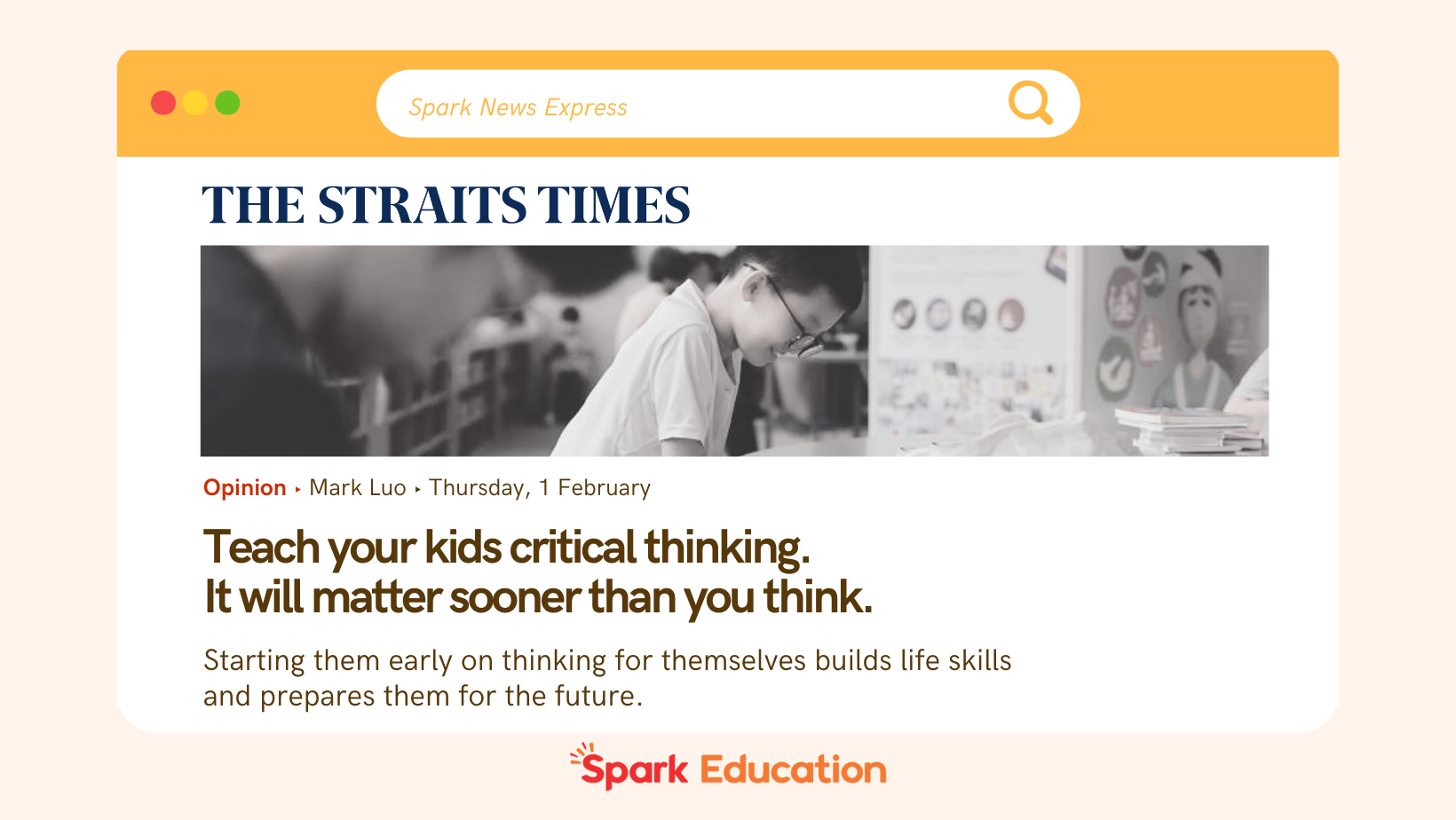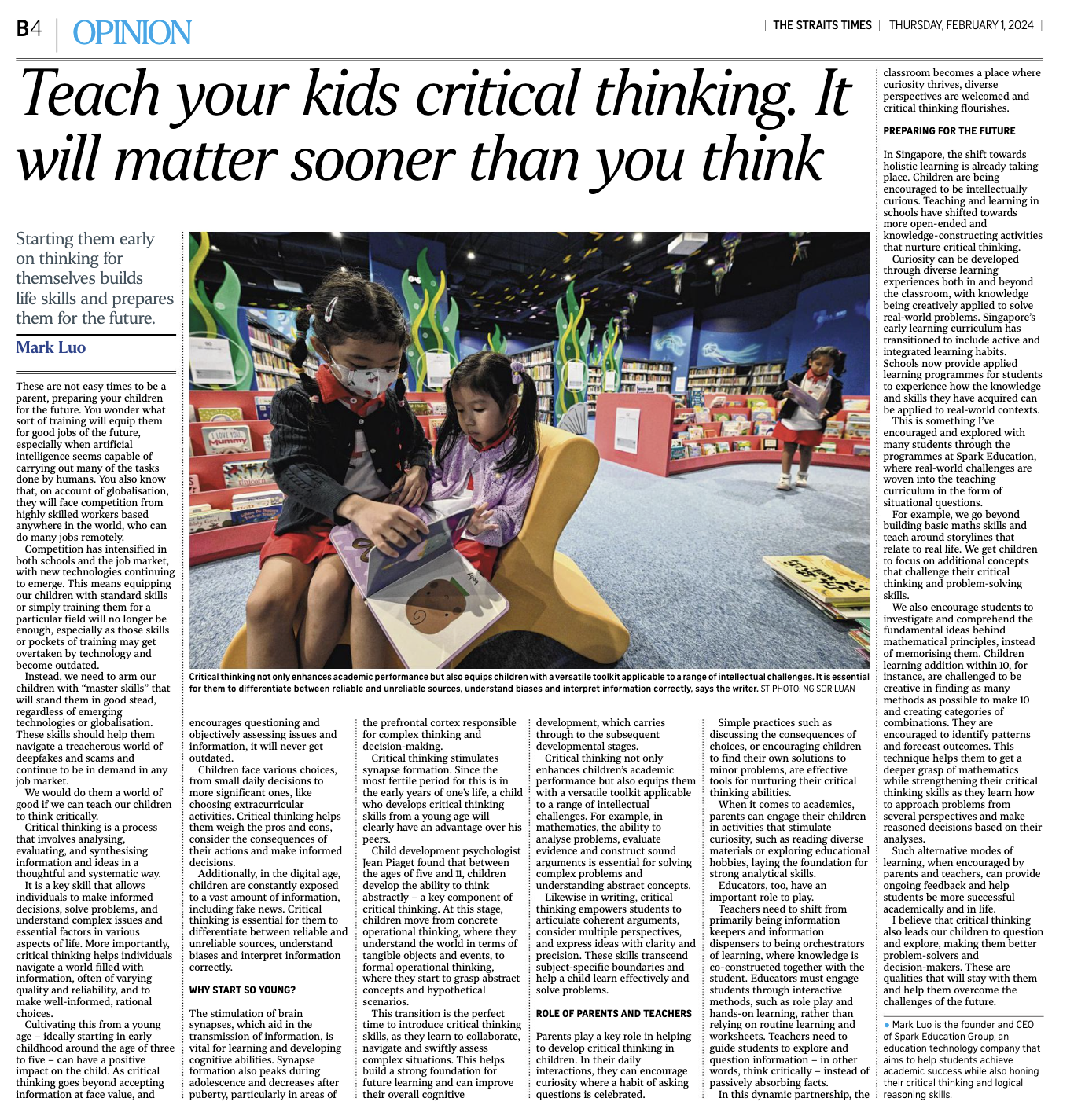
Picture this: it’s the year 2030. Your child is stepping into a world where AI reigns supreme and global competition is fiercer than ever. In this fast-paced landscape, what skills will set them apart? Mark Luo, our visionary Founder and CEO, has a compelling answer: critical thinking.
At Spark, we believe that critical thinking leads our children to question and explore, making them better problem-solvers and decision-makers. The Straits Times shares Mark insights on teaching kids critical thinking as the key to unlocking their future success.
Teach kids critical thinking, it will matter sooner than you think
Starting them early to think for themselves builds life skills and prepares them for the future
These are not easy times to be a parent, preparing your children for the future. You wonder what sort of training will equip them for good jobs of the future, especially when artificial intelligence (AI) seems capable of carrying out many of the tasks done by humans. You also know that, on account of globalisation, they will face competition from highly-skilled workers based anywhere in the world, who can do many jobs remotely.

Why so important?
Competition has intensified in both schools and the job market, with new technologies continuing to emerge. This means equipping our children with standard skills or simply training them for a particular field will no longer be enough, especially as those skills or pockets of training may get overtaken by technology and become outdated.
Instead, we need to arm our children with ‘master skills’ that will stand them in good stead, regardless of emerging technologies or globalisation. These skills should help them navigate a treacherous world of deep fakes and scams and continue to be in demand in any job market.
We would have done them a world of good if we can teach our children to think critically.

What is critical thinking?
Critical thinking is a mental process that involves analysing, evaluating, and synthesising information and ideas in a thoughtful and systematic way. It is a key skill that allows individuals to make informed decisions, solve problems and understand complex issues, and essential factors in various aspects of life.
More importantly, critical thinking helps individuals navigate a world filled with information, often of varying quality and reliability, and to make well-informed, rational choices. Cultivating this from a young age – ideally starting in early childhood around the age of three to five – can have a positive impact on the child. As critical thinking goes beyond accepting information at face value, and encourages questioning and objectively-assessing issues and information, it will never go out of fashion and never get outdated.
Children face various choices, from small daily decisions to more significant ones, like choosing extracurricular activities. Critical thinking helps them weigh the pros and cons, consider the consequences of their actions, and make informed decisions.
Additionally, in the digital age, children are constantly exposed to a vast amount of information, including fake news. Critical thinking is essential for them to differentiate between reliable and unreliable sources, understand biases, and interpret information correctly.
Why start so young?
The stimulation of brain synapses, which aid in the transmission of information, is vital for learning and developing cognitive abilities. Synapse formation also peaks during adolescence and decreases after puberty, particularly in areas of the prefrontal cortex responsible for complex thinking and decision-making.
Critical thinking stimulates synapse formation. Since the most fertile period for this is in the early years of one’s life, a child that develops critical thinking skills at age young age will clearly be at an advantage over his peers.

What do the child psychologists say?
Child development psychologist, Jean Piaget, found that between the ages of five and 11, children develop the ability to think abstractly—a key component of critical thinking. At this stage, children move from concrete operational thinking, where they understand the world in terms of tangible objects and events, to formal operational thinking, where they start to grasp abstract concepts and hypothetical scenarios.
This transition is the perfect time to introduce critical thinking skills, as they learn to collaborate, navigate and swiftly assess complex situations. This helps build a strong foundation for future learning and can improve their overall cognitive development, which carries through to the subsequent developmental stages.
Critical thinking not only enhances students’ academic performance but also equips them with a versatile toolkit applicable to a range of intellectual challenges. For example, in mathematics, the ability to analyze problems, evaluate evidence, and construct sound arguments is essential for solving complex problems and understanding abstract concepts. Likewise in writing, critical thinking empowers students to articulate coherent arguments, consider multiple perspectives, and express ideas with clarity and precision. These skills transcend subject-specific boundaries and help a child learn effectively and solve problems.
Role of parents and teachers?
Parents play a key role in helping to develop critical thinking in their children. In their daily interactions, they can encourage curiosity where a habit of asking questions is celebrated. Simple practices such as discussing the consequences of choices, or encouraging children to find their own solutions to minor problems are effective tools for nurturing their critical thinking abilities.
When it comes to academics, parents can engage their children in activities that stimulate curiosity, such as reading diverse materials or exploring educational hobbies, laying the foundation for strong analytical and problem-solving skills.

Educators, too, have an important role to play.
Teachers need to shift from primarily being the information keepers and information dispensers to being orchestrators of learning, where knowledge is co-constructed together with the student. Educators must work to engage students through interactive methods, such as role play and hands-on learning, rather than relying on routine learning and worksheets. Teachers need to guide students to explore and question information – in other words, think critically – instead of passively absorbing facts.
In this dynamic partnership, the classroom becomes a place where curiosity thrives, diverse perspectives are welcomed, and critical thinking flourishes.

Be future-ready?
In Singapore, the shift towards holistic learning is already taking place. Children are being encouraged to be intellectually curious. Teaching and learning in schools have shifted towards more open-ended and knowledge-constructing activities that nurture critical thinking.
Curiosity can be developed through diverse learning experiences both in and beyond the classroom, with knowledge being creatively applied to solve real-world problems. Singapore’s early learning curriculum has transitioned to include active and integrated learning habits. Schools now provide applied learning programmes for students to experience how knowledge and skills they have acquired can be applied to real-world contexts.
This holistic approach acknowledges that education extends beyond textbooks, aiming to nurture students who are not only academically competent but also socially aware and emotionally resilient.

At Spark Education?
This is something I’ve encouraged and explored with many students through the programmes at Spark Education, where real-world challenges are woven into the teaching curriculum in the form of situational questions.
For example, we go beyond building basic math skills and teach around storylines that relate to real life. We get children to focus on additional concepts that challenge their critical thinking and problem-solving skills.

We also encourage students to investigate and comprehend the fundamental ideas behind mathematical principles, instead of memorising them. Children learning addition within 10, for instance, are challenged to be creative in finding as many methods as possible to make 10 and creating categories of combinations. They are encouraged to identify patterns and forecast outcomes. This technique helps students get a deeper grasp of mathematics while also strengthening their critical thinking skills as they learn how to approach problems from several perspectives and make reasoned decisions based on their analyses.
Such alternative modes of learning, when encouraged by parents and teachers, can provide ongoing feedback and help students be more successful academically and in life.
I believe that critical thinking also leads our children to question and explore, making them better problem-solvers and decision-makers. These are qualities that will stay with them and help them overcome the challenges of the future.

Spark News Express: Critical Thinking
Read the original article: https://www.straitstimes.com/opinion/teach-your-kids-critical-thinking-it-will-matter-sooner-than-you-think

About Spark Education Group
Founded in 2017, Spark Education Group is headquartered in Singapore and has served over 700,000 students globally. Its portfolio of education brands combines research-based pedagogy with technology to improve the learning experience and educational outcomes for students around the world. Recently accredited by STEM.org, it was awarded “Best Interactive Learning Experience” at the EdTech Asia Summit and further recognised as a Parent and Teacher Choice Gold Medal Recipient.




